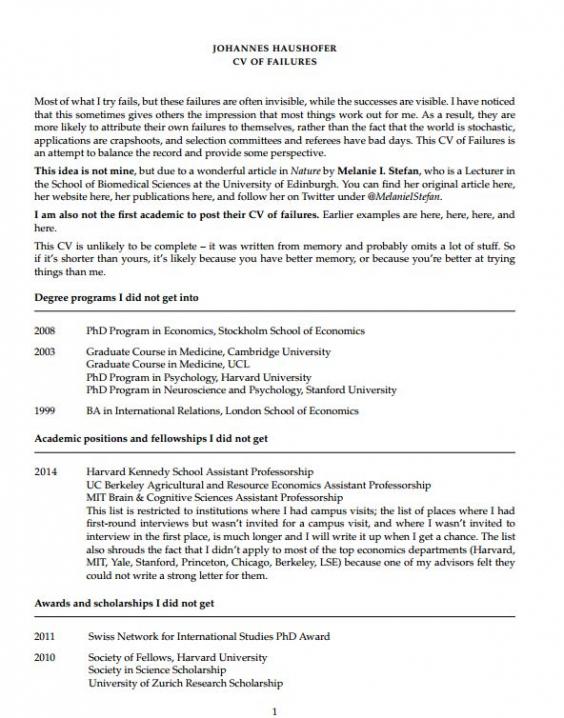We are so habituated of drafting a resume that is sparkling with our achievements and degrees. We highlight all the successes that we have ever achieved, but all of our failures are hidden, buried somewhere in our minds. So how about being open about your failures, as you are with your successes by making a failure resume?
Say what? Yes, a resume flooded with all of your failures. Why on earth would someone do that? Well, Johannes Haushofer, the Princeton psychology professor, uploaded a CV of failures, which received an overwhelming reaction online. He thinks it is important to fail in order to succeed. In his CV of failures, he has mentioned all the degree programs he did not get into, academic positions and fellowships he did not get, and awards and scholarships that he failed to receive.
Have a look:

CV of Failures – Johannes Haushofer (Princeton)
Failures are really important; failures are where change happens; failures make us learn some really essential life lessons. Failures make us realize how we have progressed and make us value our successes. However, failures also bring embarrassment for most of us because we are not ready to accept our flaws. It is really difficult to accept that we didn’t get something because we didn’t work hard enough or we weren’t good enough.
What is a failure resume?
It is simply a document that highlights all of your unsuccessful attempts and past failures.
Why should I make a failure resume?
- To identify your weaknesses: It will help you figure out an answer for one of the most hated interview question – “What are your greatest weaknesses?” After you have made a resume highlighting all of your failures, it would be easier for you to identify your weaknesses that are hindering your success. Plus, interviewers will no longer have to hear that your weakness is “hard working” or “dedication to work” or some other strength that is deliberately converted into a weakness.
- You would be able to give real examples: Having a list of things that didn’t work out will help you illustrate examples of what you learned from your mistakes and how you are working towards improving yourself. It will remind you of the things that you have forgotten about, to let you know how you managed to succeed even after so many failures.
- To learn about failures: Instead of looking at failures as embarrassment, you would be able to see how it helped you grow and reframe the failure into success. Failing indicates that you are trying to succeed and you are working towards your goal, it is the beginning, not the end.





